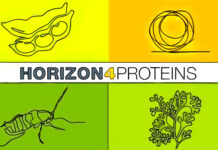Horizon4Proteins-a group of consortia participating in the NextGenProteins, SusinChain, ProFuture, Smart Protein, Giant Leaps and Like-a-Pro research projects in Horizon 2020 and Horizon Europe-proposes to the European Commission the adoption of eight urgent measures to foster the development of the market for alternative proteins to animal proteins, in the ‘policy brief’ below.
Horizon4Proteins
Researchers joining Horizon4Proteins-universities, research institutes, industries and nonprofits-are dedicated to the analysis and development of innovative proteins, exploring various opportunities. Plant chains, microalgae, insects, bacterial single-cell proteins, etc.
However, the entry and success of these foods on the ‘mass market’ postulates cooperation from institutions, which should take urgent measures in the various areas of consumer information, regulation of novel foods and functional ingredients, taxation and financing.
The role of alternative proteins
‘The development of alternative proteins has emerged as a powerful strategy to mitigate climate change, improve food security, reduce food waste and promote healthier diets.
Both IPCC (Intergovernmental Panel on Climate Change) and SAPEA (Science Advice for Policy by European Academies), in their latest reports, emphasize the role of plant-based diets in climate mitigation and adaptation‘ (Lucia Hortelano, ProVeg International, Policy Officer).
Eight key actions
The Old Continent is still not very permeable to innovation in agrifood supply chains, as we have seen. (1) Therefore, the ‘policy brief’ of of Horizon4Proteins indicates eight crucial areas of intervention, which should be considered by the different DGs of the European Commission in order to foster the harmonious development of the sector.
1) Labeling and marketing standards
Improve marketing and labeling standards for food and protein alternatives, ensuring accessibility and clarity for consumers.
2) Conventional designations
Allow dairy designations to be used for non-dairy products as well, providing essential health and allergen information.
3) European-level definitions.
Establish clear and consistent definitions across the EU for vegetarian and vegan food products to help consumers make informed choices.
4) Sustainability labeling on the front of the package.
Introduce mandatory sustainability labeling, on the front of the package, to raise consumer awareness of the value of sustainable choices.
5) Functional natural ingredients
Simplify and harmonize regulations for the use of functional natural ingredients derived from plants and microalgae, reducing administrative and economic burdens on operators.
6) Fair tax system
Addressing the imbalance in taxation by introducing common VAT rates in the EU that would reduce the final consumer prices of plant-based foods with a smaller carbon footprint. 0% for fruits, vegetables and legumes (organic, ed.).
7) Support measures, including research
Leverage EU public funding mechanisms to accelerate the shift to food systems with a greater emphasis on plant-based options.
8) Review the regulation on novel foods
Revise the Novel Foods Regulation to reduce regulatory barriers that currently prevent and/or slow down the introduction of alternative proteins into the EU market for years.
The role of public procurement
Horizon4Proteins also affirms the need to engage Green Public Procurement to support the shift to plant-based and sustainable diets. This includes integrating plant-based foods into the EU’s minimum criteria for sustainable public procurement and considering sustainability standards for fortified plant-based products.
More funding for research
The Horizon4Proteins Policy Brief emphasizes the need for increased R&D funding for innovation in plant and alternative proteins. The EU’s climate and sustainability goals depend in laega part on agri-food systems.
An open discussion
The Horizon4Proteins consortium welcomes inquiries and further discussions on these essential policy actions and stands ready to contribute to the transformation of the alternative protein sector in the EU.
Dario Dongo
Notes
(1) Dario Dongo, Andrea Adelmo Della Penna. Horizon4Proteins. Protein research confronted with EU policies and rules. GIFT (Great Italian Food Trade). 21.5.23
Dario Dongo, lawyer and journalist, PhD in international food law, founder of WIISE (FARE - GIFT - Food Times) and Égalité.








